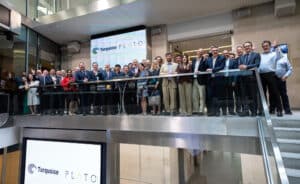In June Turquoise Plato managed to celebrate the five-year anniversary of their cooperation agreement in person at a market close ceremony at the London Stock Exchange Group after it had been delayed by the pandemic.
Turquoise signed a cooperation agreement with Plato Partnership in September 2016 which formally brought together buy side, sell side and a trading venue for the first time to deliver increased efficiencies in anonymous European equity block trading. Plato Partnership is a not-for-profit industry group representing the buy and sell-side which came together with a vision of improving equity market structure in Europe and reducing trading costs for end investors.

The London Stock Exchange’s MTF rebranded its non-displayed services as Turquoise Plato, including Turquoise Plato Block Discovery and Turquoise Plato Uncross.
Robert Barnes, group head of securities trading and CEO Turquoise Global Holdings at London Stock Exchange Group, told Markets Media that market participants have used Turquoise Plato to trade more than €1.3 trillion of equities at the midpoint and electronic block trading, including more than €577bn via Turquoise Plato Block Discover and its conditional order workflow since the co-operation was launched.
Barnes said: “Turquoise Plato Block Discovery is the leading fully automated service and electronic block trading at midpoint has become market convention with asset managers able to achieve significant investment efficiencies.”
Turquoise Plato users have matched single trades above €20m at the midpoint in multiple securities from six countries, with the largest trade in a German stock at €27m according to Barnes. In comparison, he said the average trade size on many electronic exchange order books is €0.01m and Turquoise Plato consistently offers industry-leading low price reversion after the trade, which is a measure of execution quality.
“Coincident with this trend, we routinely see single orders above €100m or €150m entered into Turquoise Plato that partially execute,” he added. “The insight for the community is that the automated service caters well for large orders.”
He highlighted another feature of blocks clustering with other blocks, and follow-on block liquidity within seconds or minutes after the immediate print of a block trade matched via Turquoise Plato.
In order to efficiently inform the buy side of this follow-on block liquidity while minimising information leakage, Turquoise Plato has designed an innovative notification integrated with partners OpenFin and FlexTrade. A block trade on Turquoise Plato in a stock that is relevant to an investor can immediately alert that investor’s execution management system. The investor can choose or have set rules that auto populate an order ticket via a broker of choice, or algo wheel directly to Turquoise in order to increase the probability of capturing that follow on block liquidity.
“This is the first time three different actors across a trade have come together to deliver an integrated innovation for the benefit of the buy and sell side,” Barnes added.
Connecting equities globally
Barnes argues that Europe has the best quality of execution mechanisms on a per stock basis, with lit order books, the closing auction and the rich intraday liquidity opportunities for active investors. However, the growth in European equities values traded trails those of America and Asia.
As a result the exchange has spoken to over 100 brokers and sees rising demand for US stocks from Asian investors, including outside of normal US market hours. Last year, the exchange connected Asia to the US by enabling Turquoise members to trade fungible US securities on the existing Turquoise lit order book, with direct settlement into The Depository Trust Company (DTC) in the US.
“Senior leaders among Asian clients have told us this could be a game changer,” said Barnes. “Turquoise can meet demands in Asia for increasing early hours trading relative to the market open in the US and, for the first time, provide a single connection to trade US stocks as well as the UK, Swiss and European stock universe.”
In addition, Asian brokers have a new way to offer a more diverse portfolio to their clients, enhance their business development and benefit from Turquoise’s differentiated execution channels and midpoint electronic blocks to help address the higher implicit trading costs in Asia, where bid offer spreads are wider than in the UK and Europe.
“The initiative signposts our ambition to connect financial centres and enable equities to be more available worldwide,” added Barnes. “Not only will access to our stock universe become more efficient but we will also be able to scale our innovations designed in partnership with the community, such as midpoint electronic block trading and frequent batch auctions, around the world.”
He believes there is a bigger probability that LSEG will be able to increase overall turnover of equity trading in Europe which will enable brokers to offer more value-added services through interconnection.
“We want to continue to deliver the best results on a continuous basis,” said Barnes. “Imagine a world where ultimately you can trade equities 24 hours a day. To deliver that vision we need to enable customers to do more with what they have, further innovation in the market and to deliver ever better results.”
Barnes sees the evolution of the market as more cooperation and collaboration for mutual benefit.
“We understand well the value of the network effect, and that is why we feel that financial centres that connect can thrive,” he added. “After years of mandatory projects such as MiFID II and contingency planning for Brexit, the industry can now come together and work on the next generation of tools and a relentless focus on innovation and efficiency.”
Retail demand
Institutions, particularly in Europe, have expressed interest in increasing interaction with a growing retail order flow according to Barnes. This year Turquoise Plato Lit Auctions will add a flag specifically for retail to enable buy-side institutions through their brokers to interact and compete with market makers.
“This new Turquoise model is not a payment for order flow model, and we are not segregating retail orders away from institutional members in a separate book,” added Barnes. “The beauty of the model is the potential to get midpoint execution for these retail orders, a better execution for both buyer and seller.
Barnes said Turquoise is delighted to be working with retail intermediaries to introduce its model to Europe and the UK with the aim of empowering retail intermediaries with the same powerful execution tools that it provides to wholesale institutions.
Another area of innovation that Barnes highlighted is continuing to answer the call from sovereign wealth funds and other investors keen to support the growth of small and medium-sized enterprises through growth markets.
“London Stock Exchange’s AIM is the largest European SME growth market and Turquoise admitted for trading the top AIM order book traded securities in 2017,” he said. “More recently we have added Euronext Growth stocks.”
He argued that AIM offers the full selection of interoperating clearing houses while Euronext Growth clears via LCH SA in Paris and clearing house interoperability, which has been championed by LSE for decades, has been successful in delivering significant savings to the industry.
“Embracing the preferred clearing model can reduce settlement costs by up to 50% and we’ve seen significant growth Euronext Growth activity in the last year, although from a low base,” said Barnes. “Our Q2 2022 quarterly value traded of Euronext growth stocks compared with Q2 2021 has increased by 116%, that is more than a factor of two.”





